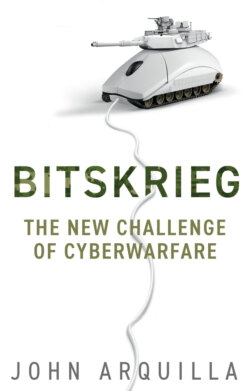Читать книгу Bitskrieg - John Arquilla - Страница 13
An era of social networks and “netwars”
ОглавлениеWithout question, cyberwarfare is on the rise throughout the world. Individuals, commercial companies, and institutions of all sorts are among the first to feel its sting, largely at the hands of those who click for pecuniary purposes. But the realms of “strategic crime” and subversion – primarily consisting of the theft of intellectual property in support of national aims, spying, and political warfare – are expanding at very rapid rates as well. All this is unfolding, undoubtedly, because defensive systems have proved so poor thus far. As to the more military aspects of cyberwar, the single-minded emphasis on developing this mode of operations in an inherently “strategic” manner has stunted the growth of a battle doctrine (Bitskrieg) implied and enabled by advances across a range of selected communications and information technologies. And when it comes to the rapid evolution of intelligent machines that lie at the heart of the world’s latest arms race, there is a most curious phenomenon: authoritarian societies that have more centrally planned economies – supposedly inferior social designs – are well ahead of liberal, market-based nations with whom they are competing. Given that all forms of cyberwar – from the many abovementioned types of hacks to cybotage, political warfare, and new modes of battle – are and require “cool,” it is somewhat surprising that those nations whose governance systems are considered balky, over-controlling, and sub-optimal are doing so well in the development of cool-war techniques. Most curious indeed.
There is one more important aspect of “cool” to consider in anticipation of future developments affecting society and security: Marshall McLuhan’s. Half a century ago, McLuhan was contemplating “war and peace in the global village,” and one of his keenest insights had to do with the notion of “cool media.” The key distinguishing factor in his notion of “coolness” was counterintuitive: for McLuhan, the more the technology encouraged accessibility and mass engagement, the cooler it was. As he put it, “cool media are high in participation or completion by the audience.”54 Think of YouTube as an example of McLuhan’s notion of coolness as measured in terms of levels of participatory “reach” and networked interactivity. In practical terms, McLuhan’s notion of cool – he even wrote of the world moving toward a state of “cool war”55 – means actualizing the potential of virtually every individual to achieve some form of power and influence, threatening the existing social order and power structures. It is interesting that McLuhan’s prescient views coincided with the rise of massive social mobilization – for civil and voting rights, against the Vietnam War, to aid the Palestinians, protect the environment, and even more – as well as the rise of violent smaller movements such as the German Baader-Meinhof Gang, the American Students for a Democratic Society, and many others in his time. A wide range of today’s terrorist groups fit this mold as well.
But it was the 1960s mass movements that truly foretold the rise and power of highly participatory – that is, “cool” – social networks such as Solidarity in Poland, and the Czechs who engineered a “velvet revolution” in the 1980s. The later-on color revolutions, almost all successful, followed a similar pattern as well.56 Even the less successful Arab Spring risings met McLuhan’s definition of “cool.” The same can be said for the waves of societal protest that raged around the world in 2019, from Latin American countries to Lebanon, Iraq, and Iran in the Middle East, and on to Hong Kong. All “cool,” in McLuhan’s sense, because of their high levels of engagement and interactive citizen/netizen participation. Essentially leaderless, they networked in ways allowing pursuit of a common goal absent central control. Kevin Kelly picked up on this theme neatly, noting the coolness, in practice, of digital media as a logical extension of Marshall McLuhan’s concept.57 David Ronfeldt and I used the term “social netwar” as our way to describe this subset of cyberwar, as manifested in civil conflicts within nations.58 In these cases, the “cyber” nature of the battle is concentrated in the militants’ use of information technologies to coordinate actions, strikes, gatherings, and in the governmental authorities’ counter-efforts to limit networking – all too often ending in violent repression due to failure to disrupt the grassroots networks by other means.
Clearly, we are living in a cool war world whose evolution is propelled by information and communications technologies. It is a highly conflictual world, in that war – particularly cyberwar in its myriad forms – is no longer primarily the province of nations. Networks, even small ones – and even individuals – can now wage one or another form of cyberwar. Dark alliances may even arise between nations and networks – think of Hezbollah’s close ties to Iran, for example, or the various hacker groups so friendly to Russia. The cyberwars waged in this new age of conflict can aim at innocent noncombatants and their homeland infrastructures – as strategic bombing has in earlier wars; attack commerce, much as pirates and other sea raiders have from time immemorial; and spark new modes of insurrection against authority. The fresh challenge of cyberwar is also driving yet another great transformation of so-called “conventional war,” this time not based primarily on advances in weaponry, but more broadly on the notion of “steering” – remember that Greek root, kybernan – the course of a conflict by achieving an edge over the adversary in the gathering and management of timely, relevant information.
The good news is that cyberwar aims more at disruption than destruction, at achieving aims and goals at less cost, with less bloodshed, even in open warfare. The bad news is that there is a terrible imbalance between offense and defense today, with attackers having the edge, in and beyond cyberspace. How this has happened and how to mitigate this growing threat are issues considered next.
